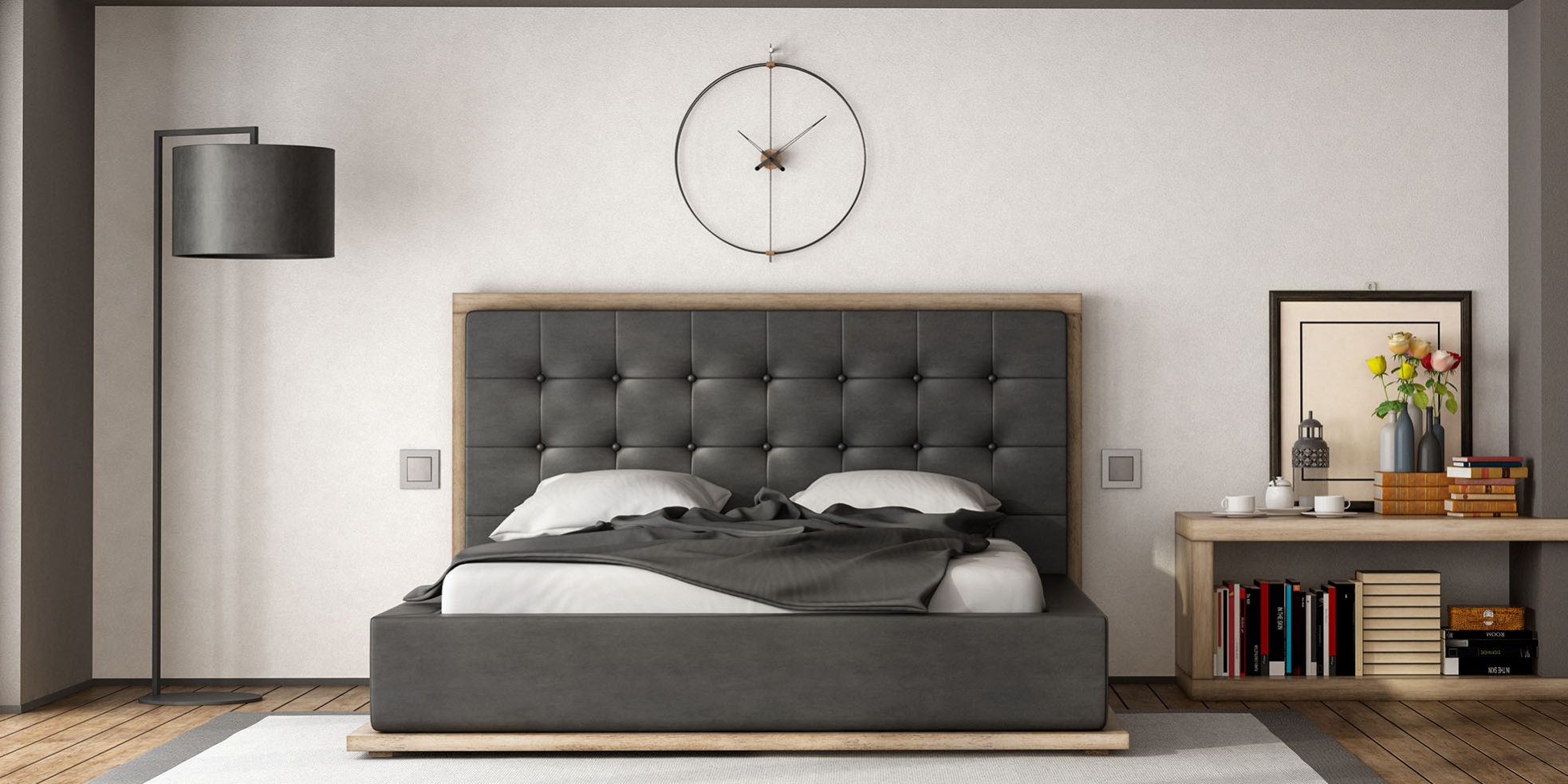The Pros and Cons of the Top 9 Bedroom Flooring Materials
Choosing the perfect bedroom floor can be a challenging task. It needs to be a good bedroom flooring idea that combines comfort, attractiveness, durability, and easy maintenance. Moreover, it should complement the room’s style and design preferences. The bedroom flooring is an intimate surface we step on barefoot every morning and before bed. It has a physical and psychological effect on us, making it a significant design decision.
When it comes to flooring materials, there are several options available, including solid hardwood, real wood flooring, textured cut pile carpeting, engineered hardwood, laminate, and even cork flooring. Each has advantages and disadvantages, and the choice will depend on various factors. For example, if you’re concerned about environmental issues, you may opt for cork flooring or laminate, which are eco-friendly options.
If you prefer the natural beauty of wood, consider solid hardwood or real wood flooring. These are perfect bedroom floors that bring warmth and elegance to the room. They are durable and long-lasting, making them an excellent investment. On the other hand, textured cut pile carpeting provides comfort, especially during colder months. It is also easy to maintain and comes in different colors and textures that can match your room’s style.
When determining what flooring is best for bedrooms and choosing your bedroom flooring, it’s important to consider factors such as who will use the room, environmental concerns and design style preferences. For example, engineered hardwood is a good bedroom flooring idea for homes that plan to sell sooner rather than later. It’s durable, easy to install, and comes in different styles that fit any room’s design style. It is also a more affordable option than solid hardwood, making it an excellent investment.
The flooring you choose for your bedroom significantly impacts your life. It should be a perfect bedroom floor that is comfortable, attractive, durable, easy to maintain and matches your room’s style. Whether you opt for hardwood floors, textured cut pile carpeting, or even cork flooring, consider all the factors that matter to you. By doing so, you’ll make an informed decision that will add value to your home and improve your quality of life.
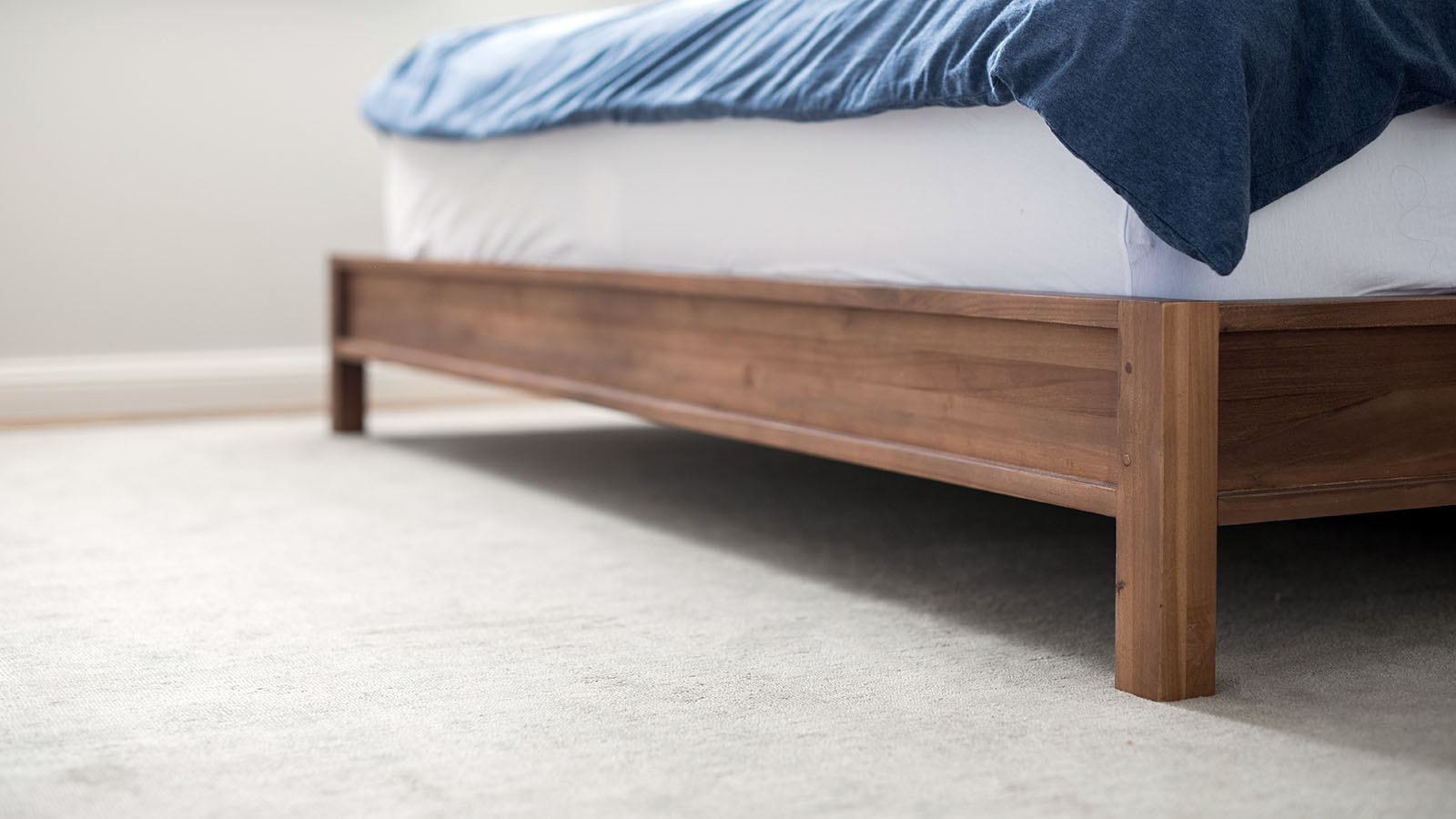
Carpeting
Selecting the right flooring option for a bedroom is a crucial decision, as it affects the entire ambiance of the room. Many western nations, including North America, favor carpet as bedroom flooring. The soft and comfortable texture of the carpet under bare feet makes it ideal for a master bedroom. It also comes in various colors and patterns that add to the room’s overall ambiance, not including stain-resistant options. Additionally, the carpet provides sound insulation and protects feet from the cold on chilly winter mornings. However, while there are numerous benefits to using carpet as a bedroom floor, there are also environmental considerations to contemplate.
Carpet comes in two major categories: cut pile and loop pile carpet. Cut pile carpets involve fiber loops that are cut, while loop pile carpets involve fiber loops that are left uncut. There are several variations of cut pile carpet, such as Saxony, textured and frieze. At the same time, Berber and level loop are the primary types of loop pile carpet. The most popular type of carpeting for bedrooms is a textured cut pile, which is incredibly soft underfoot, has a relaxed look, and is relatively resistant to dirt. Selecting the right bedroom flooring ideas is an essential decision affecting the overall atmosphere. Carpet is an excellent choice for many reasons, particularly for its soft underfoot feel, but different carpet types should be considered when choosing bedroom flooring.
Pros
- Comfort: Carpet provides a comfortable and cozy feeling underfoot, making it a popular choice for bedroom flooring.
- Insulation: Carpet provides additional insulation, helping to keep the room warmer in colder months, which can help reduce energy costs.
- Soundproofing: Carpet can help to reduce noise levels by absorbing sound, making it ideal for bedrooms where you want to create a quiet environment.
- Safety: Carpet can help prevent slips and falls, especially for children and the elderly, by providing a softer surface than hard flooring.
- Style: Carpet comes in a variety of colors, patterns and textures, allowing you to choose a style that matches your bedroom decor.
Cons
- Maintenance: Carpet requires more maintenance than hard flooring, as it needs to be regularly vacuumed and steam cleaned to prevent the buildup of dirt and allergens.
- Stains: Carpet is more susceptible to staining than hard flooring, so spills and accidents should be cleaned up quickly to prevent permanent damage.
- Allergies: Carpet can trap dust, pet hair and other allergens, triggering allergies and asthma in some people.
- Durability: Carpet can wear out faster than hard flooring, especially in high-traffic areas.
- Cost: Carpet can be more expensive to install than hard flooring, and replacing it can also be costly, especially if the subfloor needs to be repaired or replaced.
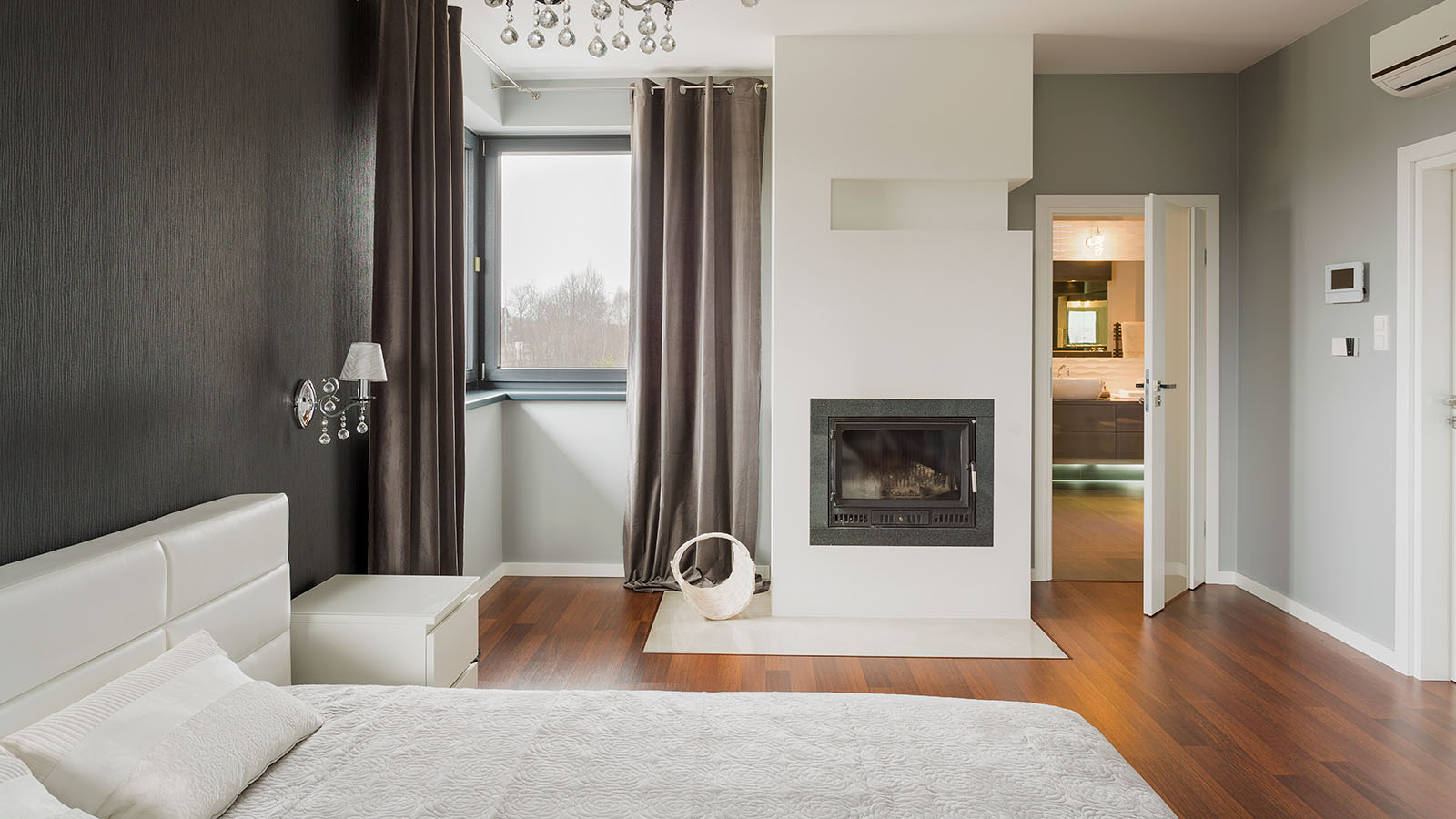
Hardwood Flooring
Wooden floors are often selected as the ideal flooring for bedrooms. From master bedrooms to smaller rooms, wood flooring options come in a variety of styles and colors to suit any decor. Real estate professionals agree that wood is the best flooring choice for adding value to a home. It’s durable, biodegradable and timeless.
Solid wood floors and engineered wood floors are the two main categories of wood flooring. Strip and plank styles are the most common bedroom flooring options, providing a classic and linear look. Wood flooring adds an element of warmth and sophistication to any decor style, making it a choice that won’t disappoint. If you’re looking for a hard surface that will last for years, wood floors are an excellent option for bedrooms and other rooms in the home.
Pros
- Durability: Hardwood is incredibly durable and can last for years with proper care and maintenance.
- Aesthetics: Hardwood flooring adds warmth, character and elegance to any bedroom.
- Easy to clean: Hardwood is easy to clean and maintain, making them an excellent option for allergy sufferers.
- Versatility: There are many types of hardwood to use, allowing you to find the perfect fit for your bedroom.
- Resale value: Hardwood can increase the value of your home and make it more attractive to potential buyers.
Cons
- Cost: Hardwood can be expensive, making them a less attractive option for budget-conscious homeowners.
- Maintenance: Hardwood requires regular maintenance, including sanding and refinishing, to keep them in good condition.
- Noise: Hardwood can be noisy and echoey, making them less desirable for homes with children or pets.
- Installation: Installing hardwood can be time-consuming and challenging, requiring professional installation.
- Vulnerability to moisture: Hardwood can be vulnerable to moisture damage, which can cause warping, cupping and other issues over time.

Bamboo Flooring
There is a wide variety of options to think about when designing your bedroom. For instance, bamboo flooring is a popular and cost-effective choice for homeowners looking for a durable and sustainable flooring option. Although bamboo is technically a type of grass, not wood, its quality and installation methods often lump it together with hardwood flooring.
Bamboo flooring is an excellent choice for those seeking a casual feel for their bedrooms. With a range of color and grain options, it is easy to find the perfect flooring choice for any bedroom. Moreover, it’s affordable. You can get materials for less than $5 per square foot, and installation costs are usually around $5 per square foot. Bamboo is a good option for master bedrooms and any other rooms in the house. It’s stylish and durable, and it feels nice underfoot.
Pros
- Eco-friendly: Bamboo is a sustainable and renewable resource, making it an excellent choice for flooring.
- Durability: Bamboo is stronger and more durable than traditional hardwoods, making it resistant to scratches and dents.
- Aesthetics: Bamboo is available in a variety of colors and patterns, allowing for a stylish and modern look in a bedroom.
- Easy maintenance: Bamboo is easy to clean and maintain, requiring only sweeping or vacuuming.
Cons
- Moisture sensitivity: Bamboo is sensitive to moisture, making it prone to warping and swelling if exposed to water.
- Limited refinishing options: Bamboo flooring cannot be sanded and refinished multiple times like traditional hardwoods, reducing its lifespan.
- Higher cost: Bamboo is generally more expensive than other types of flooring, making it less accessible for some homeowners.
- Susceptibility to scratches: Despite its durability, bamboo can still be susceptible to scratches and dents, particularly from pets or furniture.
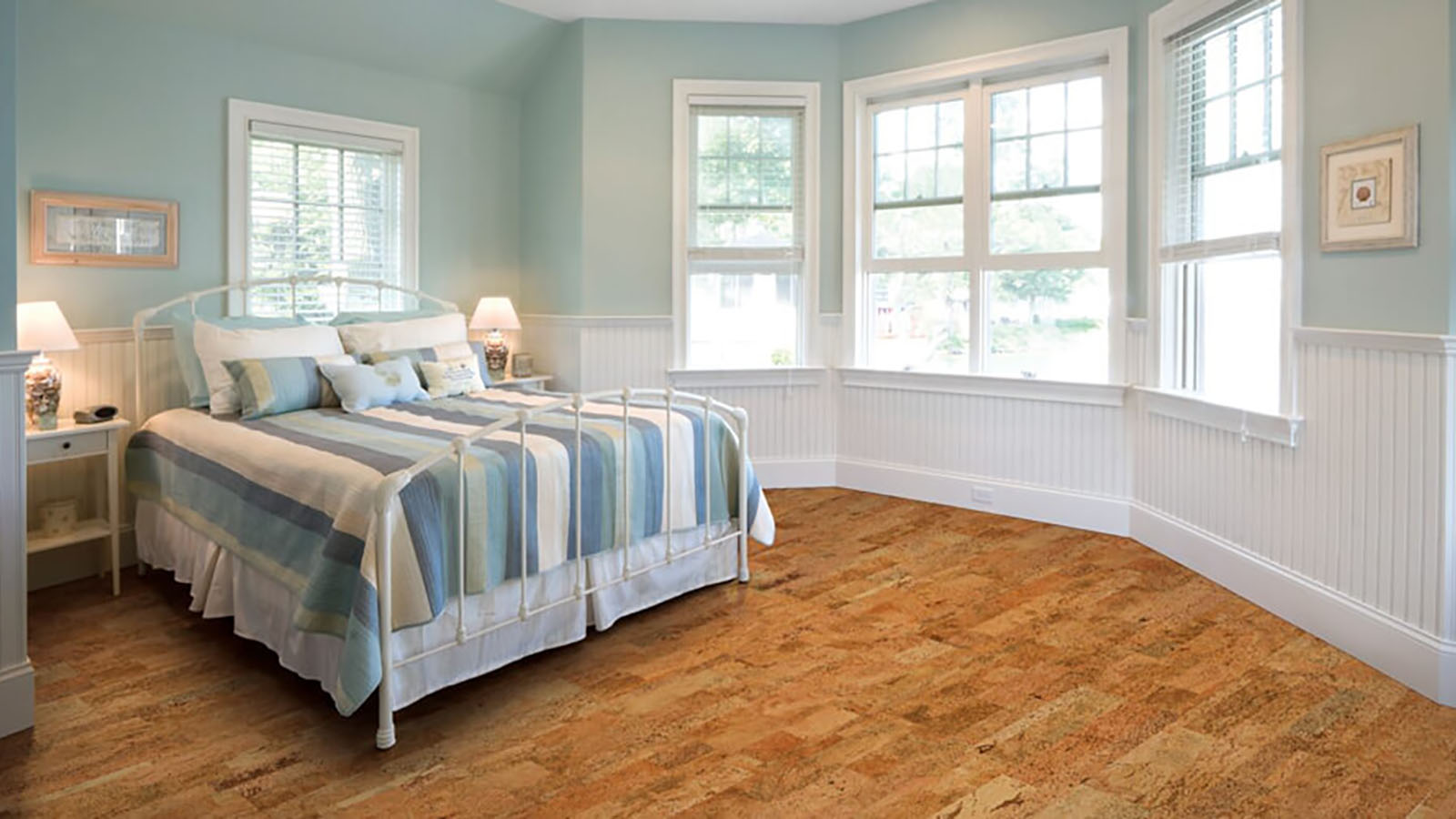
Cork Flooring
Bedrooms can benefit from a variety of options, and cork is worth considering. Not only is it a durable option, but it also provides comfortable support for long periods. Although commonly used in kitchens, natural cork is versatile enough to be used in any room, including the master bedroom.
Cork flooring is an eco-friendly choice that offers excellent insulation between floors, making it soundproof and energy efficient. The natural cork particles create a soft surface that bounces back when heels are placed on it. While it may be an expensive option, it comes in a variety of colors and is exceptionally durable. Cork is excellent for those who prefer an earthy and cozy feel in their bedrooms.
Pros
- Environmentally friendly: Cork is a natural and renewable material harvested without harming trees, making it an excellent flooring option.
- Comfortable and soft: Cork is a soft material, which makes it ideal for bedroom flooring. It is gentle on your feet and has a warm and comfortable feel.
- Easy maintenance: Cork is easy to maintain and doesn’t require much upkeep. It resists stains, scratches, and water damage and is simple to clean with a damp mop.
- Good insulator: Cork is a natural insulator that helps regulate temperature and reduce noise.
Cons
- Cost: Cork is more expensive than other flooring options, which can be a disadvantage if you’re on a tight budget.
- Durability: Although cork is resistant to scratches and dents, it can be prone to damage from heavy furniture or high heels. It may also discolor over time due to sunlight exposure.
- Limited color options: Cork is available in a limited range of colors and patterns, making it challenging to match your bedroom decor.
- Moisture susceptibility: Cork flooring can be damaged by excessive moisture, which can cause swelling and warping. It’s not recommended for use in damp areas or below-grade rooms.
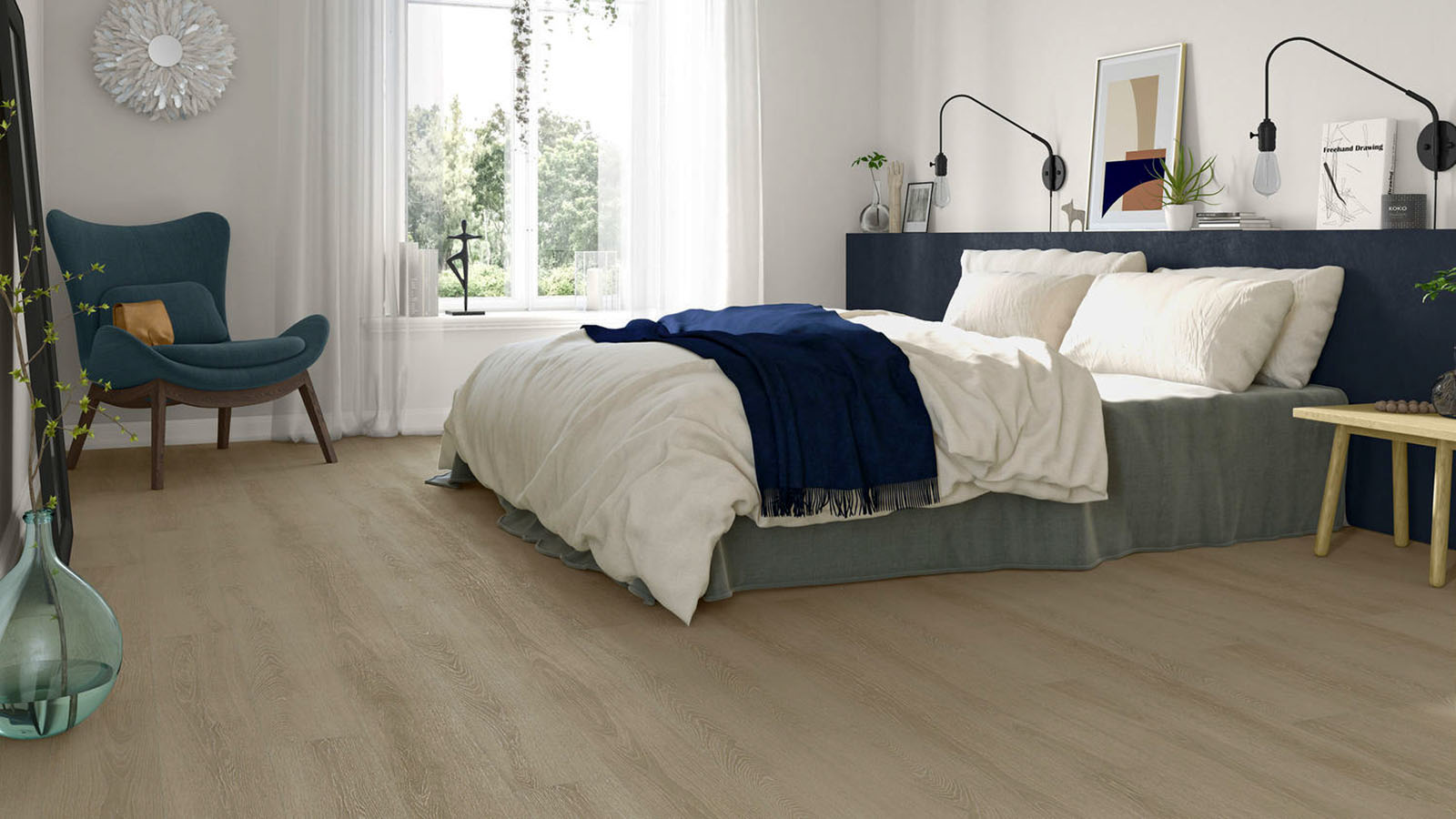
Vinyl or Linoleum Flooring
When it comes to bedroom flooring, there are several options available to suit different tastes and preferences. Vinyl flooring comes in different types, such as sheet vinyl, vinyl tiles and luxury vinyl flooring (LVF) tongue-and-groove planks. This option is excellent for bedrooms and is available in various designs that mimic wood, ceramic or stone. Vinyl is soft but protects against falls and is quieter than hardwood or tile. However, vinyl is made from plastic materials that cannot be recycled and can off-gas chemicals.
For environmentally conscious homeowners, linoleum flooring is a good choice. It’s made from natural ingredients like linseed oil, so it’s a good option for master bedrooms and other rooms in the house. It is naturally anti-microbial and hypoallergenic, making it an ideal choice for those with allergies or respiratory issues. Choosing a flooring material that can handle daily wear and tear is important. Both vinyl and linoleum are suitable for bedrooms because they are durable and easy to maintain.
Pros
- Durability: Linoleum and vinyl flooring are highly durable and can withstand heavy foot traffic without showing wear and tear.
- Low maintenance: These flooring materials are easy to clean and require minimal maintenance. They are stain-resistant and can be cleaned with a damp cloth or mop.
- Cost-effective: Linoleum and vinyl flooring are inexpensive compared to other options, such as hardwood or carpet.
- Design options: Vinyl and linoleum flooring come in a variety of colors, patterns, and textures, allowing for a wide range of design options.
Cons
- Hardness: Vinyl and linoleum flooring can be hard underfoot, which may not be suitable for those who prefer a softer surface.
- Noisy: These flooring materials can be noisy when walked on, especially in high heels or hard-soled shoes.
- Limited warmth: Vinyl and linoleum flooring may not provide the warmth and comfort of other options, especially during colder months.
- Environmental concerns: Vinyl is made from PVC, which can harm the environment. On the other hand, linoleum is made from natural materials, but its production process can still have environmental impacts.
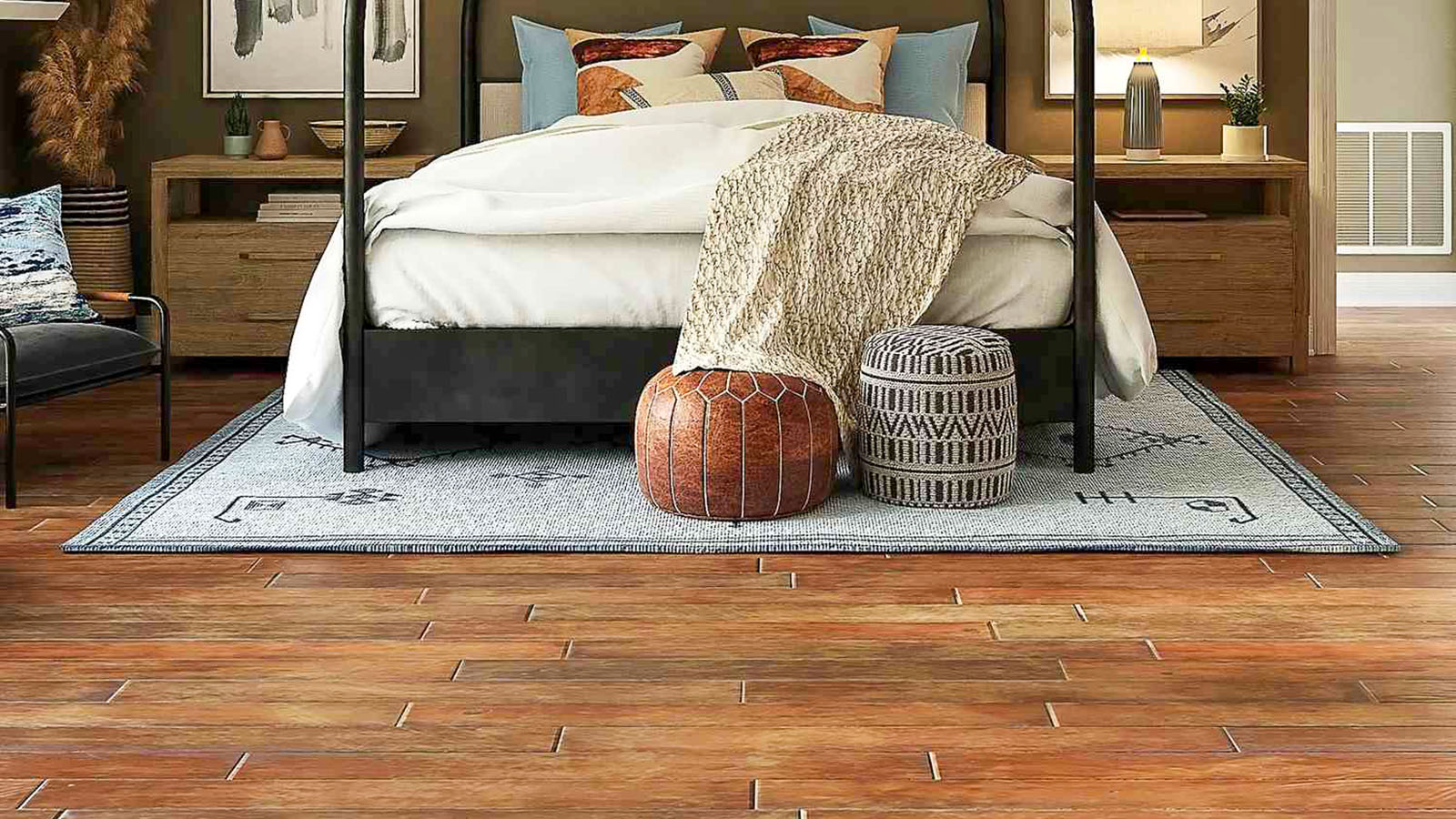
Laminate Flooring
When selecting the perfect flooring for your bedroom, you have several options. One popular choice is laminate flooring, which is known for its affordability, easy installation, and attractive appearance. It can even mimic the look of wood, stone, or metal, making it an excellent choice for various room designs. However, remember that laminate floors can be prone to scratches and buckling if they come into contact with water or other liquids.
While laminated floors do not offer sound or thermal insulation, you can improve this by using the proper underlayment. Wood veneers are a type of laminate flooring that can provide a more natural look to your bedroom. This option is less durable than natural wood, but it is still a good choice for those on a budget. With its simple installation process, you can have an attractive and long-lasting flooring option for your bedroom.
Laminate flooring is an excellent choice for your master bedroom or other rooms. Its finished floor has a clear wear layer that resists scratches and stains. Laminate floors with wood veneers are affordable, durable, and attractive. They help make your bedroom look better without spending a lot of money.
Pros
- Affordable: Laminate flooring is inexpensive compared to other options, such as hardwood or tile.
- Durable: Laminate flooring is resistant to scratches, stains and moisture making it perfect for high-traffic areas such as bedrooms.
- Easy maintenance: Laminate flooring requires minimal maintenance and can be easily cleaned with a damp mop or vacuum cleaner.
- Easy installation: Laminate flooring is easy to install and can be done by homeowners with basic DIY skills.
Cons
- Limited design options: Laminate flooring is available in limited designs, limiting your options when decorating your bedroom.
- Sound absorption: Laminate flooring can sound hollow when walking on, disturbing some people.
- Susceptible to water damage: Although laminate flooring is water-resistant, it can still be damaged by excess water or moisture.
- Not eco-friendly: Laminate flooring is made from synthetic materials and is not sustainable.
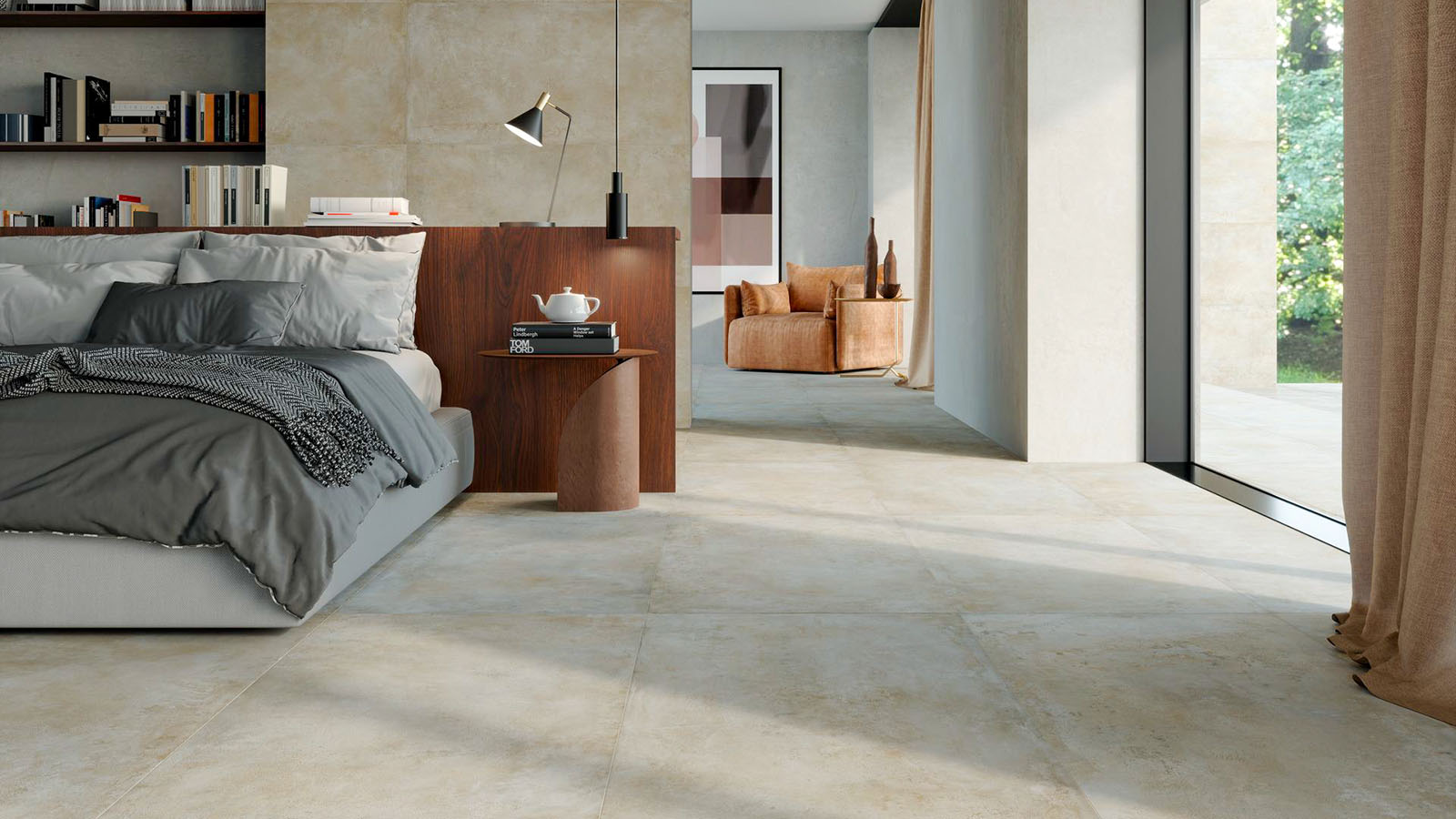
Ceramic or Stone Tile
When choosing the right bedroom flooring, one should consider both style and practicality. Of course, you might want something other than ceramic or stone flooring in your bedroom, but it can look good with certain decorating styles. These include Mediterranean, Tuscan, tropical, Spanish, or Moroccan styles. These styles often feature warm colors, intricate patterns and natural elements, making ceramic tile and stone flooring a great option.
For the master bedroom, try different flooring ideas, such as porcelain tile or stone flooring. This will add elegance and sophistication to the room. While these flooring options might seem cold, hard, or noisy, the right design and texture can create a cozy and inviting ambiance. There are many types of bedroom flooring, such as tile or stone. Tiling or stone flooring adds style and character to any bedroom.
Pros
- Durability: Tiles are incredibly durable and can last decades if properly maintained. They are resistant to scratches, stains, and wear and tear.
- Aesthetic appeal: Tiles come in a variety of colors, patterns, and textures, allowing you to create a unique and beautiful design for your bedroom.
- Easy to clean: Tiles are easy to clean and maintain. They do not absorb dirt or moisture and can be easily wiped clean with a damp cloth or mop.
Cons
- Cold and hard: Tiles can be cold and hard underfoot, making them uncomfortable walking on, especially during winter. This can be mitigated by using rugs or underfloor heating systems.
- Slippery: Tiles can be slippery, especially when wet. This can be dangerous, particularly for elderly or disabled individuals.
- Expensive: Tiles are relatively costly compared to other flooring options, making them less attractive for some homeowners.
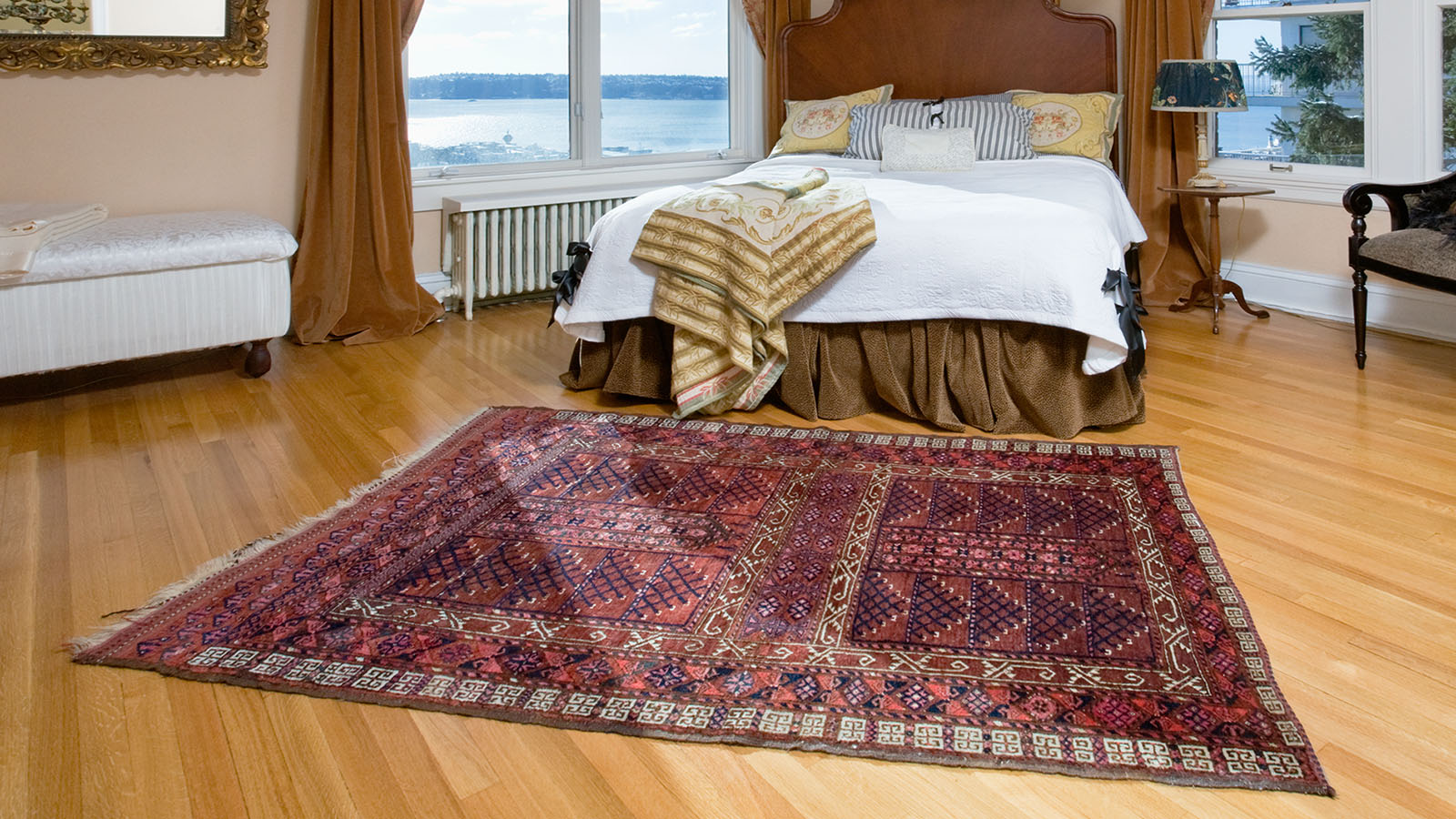
Area Rugs
Choosing the right flooring option for your bedroom is important to create a comfortable and stylish space. There are various bedroom flooring ideas, such as hardwood, laminate, tile, and carpet. However, adding an area rug to your bedroom floor can make the hard surface softer and add a touch of coziness to the space.
You can choose an area rug for your master bedroom or any other room from various sizes, colors, patterns, weaves and material options. Your personal preference is the best guide to the right rug for your bedroom. Choose an area rug that matches the decorating theme and feels soft and cozy to your feet. Have a non-slip backing, and add style to the bedroom. Remember that a good quality rug will generally last longer, look and feel better, and shed less than a cheap bargain brand. With the right flooring choice and a well-selected area rug, you can create a comfortable and stylish space in your bedroom.
Pros
- Aesthetic appeal: Area rugs can add color, texture, and style to a bedroom. They come in various patterns, sizes, and materials that can complement the décor and create a cozy and inviting atmosphere.
- Softness and comfort: Rugs can provide a cushioned surface that feels warm and cozy underfoot. This can be especially beneficial in a bedroom, where you want a soft and comfortable surface to step on first thing in the morning.
- Noise reduction: Rugs can absorb sound and reduce noise levels in a bedroom. This can be particularly helpful if you live in a noisy neighborhood or share a wall with a neighbor.
- Protection: Rugs can protect the underlying flooring from scratches, scuffs, and stains.
Cons
- Maintenance: Rugs require regular cleaning and maintenance to keep them looking and feeling their best. This can be time-consuming and may involve using special equipment or cleaning products.
- Cost: High-quality rugs can be expensive, especially if you opt for natural materials like wool or silk. This can be a significant investment for a bedroom.
- Allergies: Rugs can trap dust, dirt, and allergens, triggering allergy symptoms in some people. This can be a concern if you or a family member has allergies or asthma.
- Slipping and tripping: Rugs can be a slipping and tripping hazard, especially if they are not properly secured to the floor. This can be dangerous, especially for young children or elderly individuals.
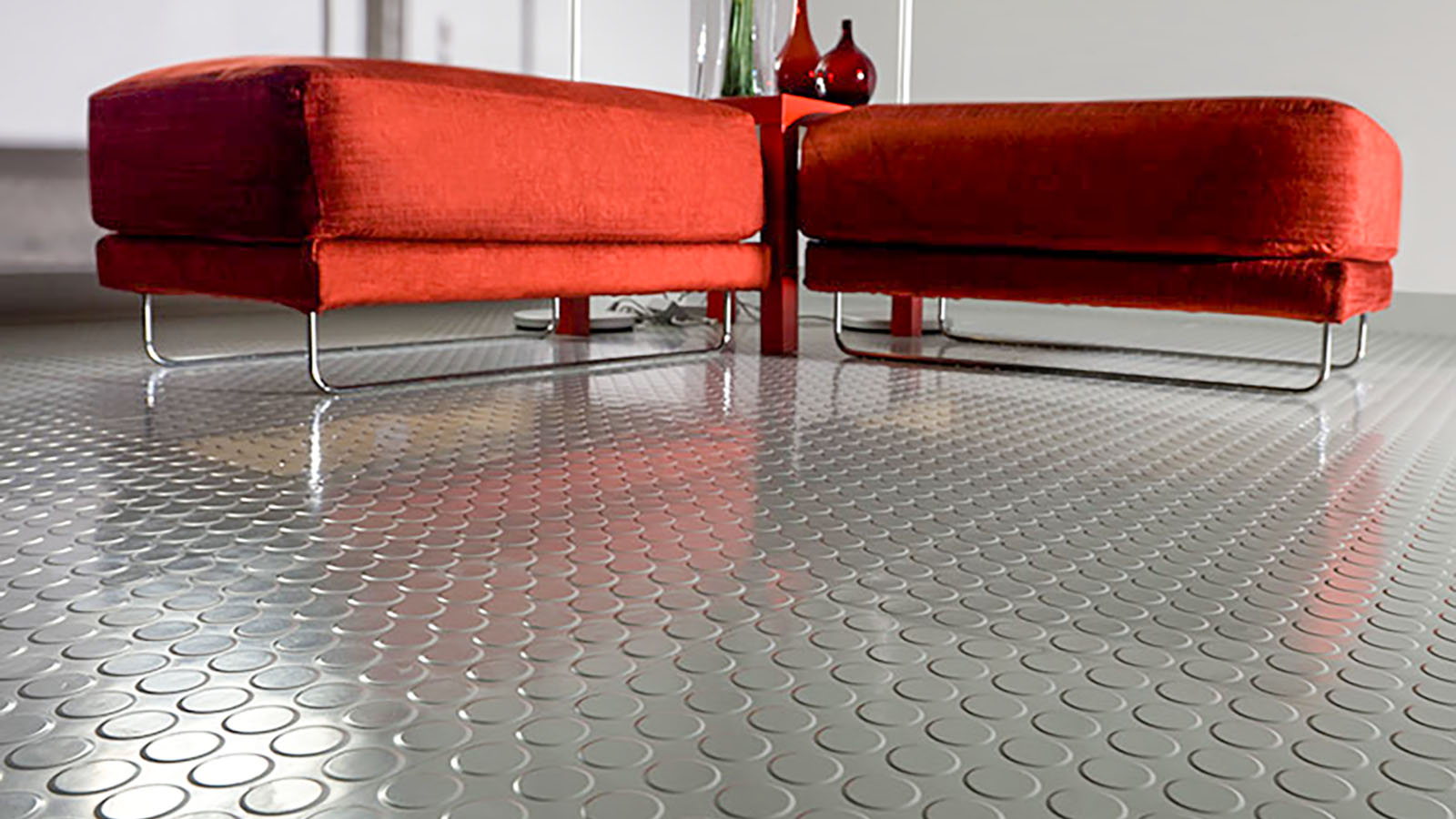
Rubber Flooring
Rubber flooring is a relatively unusual flooring material but is a smart and durable choice for bedrooms, playrooms and other rooms in your home. It can last for over 30 years, making it an excellent investment for your home. It is especially suitable for children’s rooms, as it can withstand dropped weights and is resistant to scuffs, dents, and tears. Rubber flooring comes in different colors and styles, like tile and sheet versions and flat or patterned looks. This allows you to choose from a range of bedroom flooring ideas that match your decor.
Rubber is also an eco-friendly and less expensive alternative to traditional bedroom floors. This type of flooring is resistant to fire and burns and is non-toxic when burned, making sure of your family’s safety. Additionally, recycled rubber floors are made from rubber car tires, saving them from going to landfills and making them an environmentally friendly choice. Overall, rubber flooring is an excellent option for your master bedroom or any other room in your home, providing a durable, long-lasting, and safe option that is also easy to maintain.
Pros
- Comfortable: Rubber flooring provides a cushioned and soft feel underfoot, making it comfortable for the bedroom.
- Durability: Rubber flooring is durable and long lasting, making it a cost-effective option for the bedroom.
- Soundproofing: Rubber flooring can absorb sound, reducing noise transmission from the bedroom to other parts of the house.
- Easy maintenance: Rubber flooring is easy to clean and maintain, making it a convenient option for the bedroom.
Cons
- Limited designs: Rubber flooring comes in a limited range of designs, limiting the options for personalizing the bedroom’s aesthetic.
- Chemical smell: Rubber flooring may emit a chemical smell, especially during installation, which can be unpleasant and may linger for some time.
- Slippery: Unless it is designed to be slip-resistant, rubber flooring can be slippery, especially when wet, making it a potential safety hazard.
- Cost: Rubber flooring can be expensive compared to other options, which may not be within everyone’s budget.

